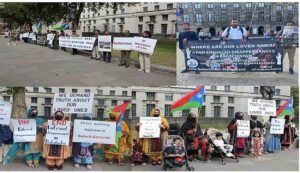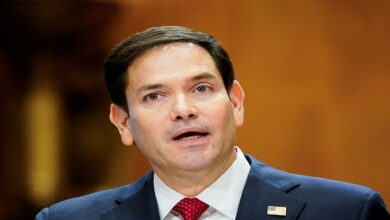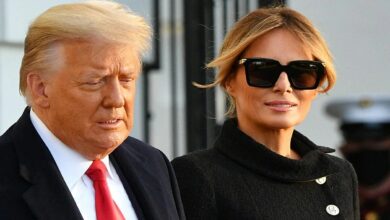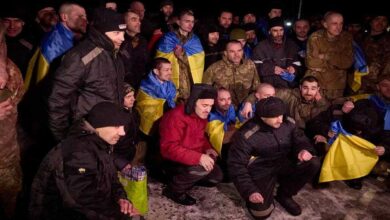A massive protest took place outside the British Prime Minister’s residence at 10 Downing Street in London
A massive demonstration was held outside the UK Prime Minister‘s home at 10 Downing Street in London in honor of International Human Rights Day.
On Tuesday, the Jeay Sindh Freedom Movement organized a protest called “Protest Against Pakistan’s Occupation and Human Rights Violations in Sindh, Balochistan, Khyber Pakhtunkhwa, Seraikistan, Gilgit-Baltistan, and Kashmir.”

Numerous human rights advocates representing the Baloch, Sindhi, Pashtun, Kashmiri, and other marginalized communities, as well as representatives of the Baloch National Movement, Pashtun Tahafuz Movement, United Kashmir People’s National Party, and Hindu Forum Europe, attended the rally.
With a huge banner criticizing the persecution in these areas, the rally focused on denouncing Pakistan’s ongoing occupation of many territories. It included pictures of Pashtun, Sindhi, and Baloch martyrs as well as those who have vanished as a result of the Pakistani government’s enforced disappearances.
Protesters yelled chants calling for the acceptance of their right to self-determination and the cessation of Pakistan’s repressive policies. Sherbano, a leader of the Pashtun Tahafuz Movement (PTM), demanded that the Pakistani government take responsibility for the heinous murders of Pashtuns in Wana, Waziristan, and Afghanistan. Salim Zaib, the head of PTM UK, called attention to political leader Ali Wazir’s unjust detention and called for the liberation of all political prisoners and unaccounted-for individuals in Pakistan.
This protest was significant because it was the first time in the 52-year history of the Jeay Sindh Freedom Movement that a nationalist Sindhi political party participated in a demonstration outside of Pakistan, giving their cause a global platform.
Kashif, a leader of the United Kashmir People’s National Party UK, called the tyranny Kashmiris endure intolerable and denounced the latest presidential edict enforced by the Kashmiri administration under Pakistan’s control. He underlined that they will continue to struggle for the independence of Kashmir until they were granted self-determination.
Sohail Abro, the chairman of the Jeay Sindh Freedom Movement, led the ceremony. Several speakers spoke to the audience, bringing attention to the continued persecution and horrors that their villages endure under Pakistani control.
The Baloch National Movement UK’s chairman, Jasim Baloch, discussed the hundreds of Baloch people who have been slain or gone missing by the Pakistani government. He said that solidarity with Sindhudesh and Pashtunistan in their common cause of liberation will bolster the Baloch struggle, which is now at a pivotal point.
The head of the Baloch Human Rights Council, Qambar Baloch, urged the international world to acknowledge the continued abuses of human rights in Balochistan and other occupied territories and underlined the value of solidarity among oppressed countries.
PTM UK leader Muhammad Ibrahim Ghafuri denounced the killings of Pashtuns along the Durand Line and emphasized the need for a unified front against Pakistan, the shared foe.
Religious fanaticism in Pakistan, especially the persecution of the Sindhi Hindu population, was condemned by human rights activist Rahul Jesrani.
He cited the assaults on Hindu sacred places and the forcible conversions of Sindhi Hindu girls as evidence that the Pakistani government was aiding religious radicals. International human rights groups should help to resolve these urgent problems, Jesrani argued.
A memorandum urging the British government to act firmly against Pakistan’s violations of human rights and to defend the rights of the oppressed countries inside Pakistan was sent to UK Prime Minister Keir Starmer’s house as the demonstration came to an end.
Former Hindu Forum Europe President Bharati Taylor denounced the pervasive human rights abuses in the area and pledged her support for South Asia’s downtrodden populations.
Because it brought attention to the continuing struggles of the Sindhi people and the larger battle for justice and self-determination for all oppressed groups under Pakistani control, this event was a turning point for the Jeay Sindh Freedom Movement.





